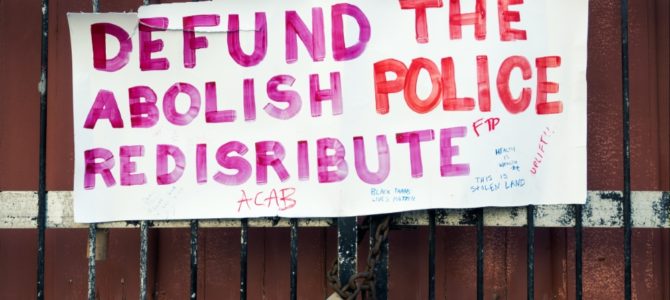
The Black Lives Matter movement seeks to counter the systemic racism they believe is foundational in American culture with a systemic solution: defunding the police. The calls to defund the police have reached the ears of every elected official, from local levels up to the federal executive. Now, the cries from the street are being echoed by celebrities.
A group of some of the most notable black artists in America have penned a letter to studios and Hollywood executives demanding the entertainment industry divest from police. But the experience of the wealthy in the absence of police will be far different than that of the average BLM protester.
While many on the left have said that defunding the police does not mean disbanding them entirely, many others have said that abolishing the police force is exactly what they have in mind. A public letter from black artists and thinkers states they are inspired by the protesters, and want to amplify their demands:
[The protesters’s] courage and imagination have inspired us to build on their necessary demands — including, chiefly, the abolition of police, and the complete dismantling of the racist prison-industrial system. Through this statement, we hope to amplify the movement’s work and to call out our own industries for what they are: institutions that promote colonialism, capitalism, and racism, and that function in exploitative and destructive ways.
In echoing the protester’s demands, these celebs claim themselves and their industry as part of the “systemic” alleged problems. Instead of using the clout and platform that accompanies celebrity status to offer leadership or guidance to those marching in the streets, they first offer to dismantle their own workplaces. The letter calls on cultural institutions to act:
…publicly condemn the use of police as a violent force that exists to further class divisions and capitalistic exploitation which harm our communities. Museums, arts foundations, theaters, studios, events venues, festivals, universities, libraries, book stores, publishing houses, schools, and social media companies must break contracts with police departments and reconceive what it means to keep art, audiences, and patrons safe. This is a first and clear step that cultural institutions must take toward the broader call to defund the police nationwide.
This level of self-obsession is so typical of members of the celebrity class. But what would this mean in terms of actionable, real consequences? If there were no police, or a force that had been cut in half or more, what would this look like?
Speaking to The Daily, John Eligan relays his conversation with a Black Lives Matter activist who details her take on what the abolishing of police would be like in practice. “It’s going to be up to every community to decide what they need,” she tells Eligan, “We can’t decide that.”
Theoretically, money would be diverted from police departments to community-based programs, where people would decide for their communities what they need. At a studio level or the level of cultural institutions across the board, those organizations and businesses would decide what they need for security.
Many options are not police-based. Facial recognition software could be used to require all visitors, artists, and executives to be vetted via criminal background checks to ensure criminals aren’t coming on set. If everyone could be fingerprinted, these fingerprints could be used to gain entry to these unpoliced spaces. Of course, studios could also hire private security companies for protection.
But while it’s one thing to attempt such reforms at the institutional level where people can consent to give up their privacy or employ cops-for-hire so these spaces stay safe, what about in entire metropolises?
Celebs Can Go Without Police — Regular Americans Can’t
Instead of police responding to homelessness, “homelessness outreach personnel” would respond. Instead of police responding to late-night domestic disputes, social workers would pull up in their Subarus ready to make a new case file. Instead of police responding to violent crime, members of the community would respond in whatever way their neighborhood group saw fit. Instead of police investigating homicides or organized crime, something else would happen — or not. According to the “Defund The Police” activists, police don’t do a great job anyway, so they wouldn’t be missed.
In his interview with the BLM activist, Elgin brought up that, while they were different and distinct cases, self-deputized members of the community took matters into their own hands to end the lives of Trayvon Martin and Ahmaud Arbery. Her response was, “I know, I get that, and I’ll be really real with you. I don’t have all the answers for that either, I don’t, and I wish I did.”
The celebs who penned this letter don’t have concrete answers either. What they demand and present are platitudes: “to break ties with the police…put their money where their mouths are…advocate for black people…get educated…[and] imagine black freedom.”
If cultural institutions stopped working with the police, they would hire private security companies to do the work instead. Private security companies are not beholden to anything or anyone other than their clients. Celebs who already have bodyguards or security details would be able to retain those services as well. While celebs would be safe and snug behind their walls of wealth, communities across the country would be left vulnerable to dangerous criminals.
When the wealthy call for defunding police, they are speaking from a place of privilege in society that means they can have little to no regard for those who are most affected by the decline in the enforcement of criminal laws.
Calls to ‘Abolish the Police’ Are Wildly Utopian
The narrative against police that tells us crime is a direct result of social inequity, and that should social inequity be destroyed crime would not exist, is driving this conversation that our nation does not need police. But it is a lie.
There is this idea that if there were no police, if that money were redirected at vulnerable communities, there would be no crime in these areas. The claim is that in the absence of systemic problems, there would be no reason for people to commit crimes. Despair and economic injustice leads to crime, goes the claim. A group called MPD150, which advocates for abolishing police in Minneapolis, states:
Crime isn’t random. Most of the time, it happens when someone has been unable to meet their basic needs through other means. So to really ‘fight crime,’ we don’t need more cops’ we need more jobs, more education, opportunities, more arts programs, more community centers, more mental health resources, and more of a say in how communities function.
This concept is not rational or reasoned. It is the eternal attempt of human beings striving for a utopia, a paradise on earth, a perfect commune where everyone has what he needs and wants for no more. It isn’t reality. Material gain does not eliminate the human drive for more; often, it accelerates it.
The black artists and celebrities of “Black Artists for Freedom” have not chosen to display leadership. Instead, they are seeking a way to remain safe within the industry that butters their bread. A group of people requesting the abolition of something they don’t even need is disingenuous at best, and callous at worst.
Every time police lessen their presence in the vulnerable communities of New York, Minneapolis, Seattle, or elsewhere, more death always comes for the downtrodden. In turn, the result is more violence and less accountability for both criminals and police.
In giving their voices to the mob, these artists have done little for liberation. Instead, all they’ve done is provided cover to those who would violate the very communities they claim a desire to protect.









